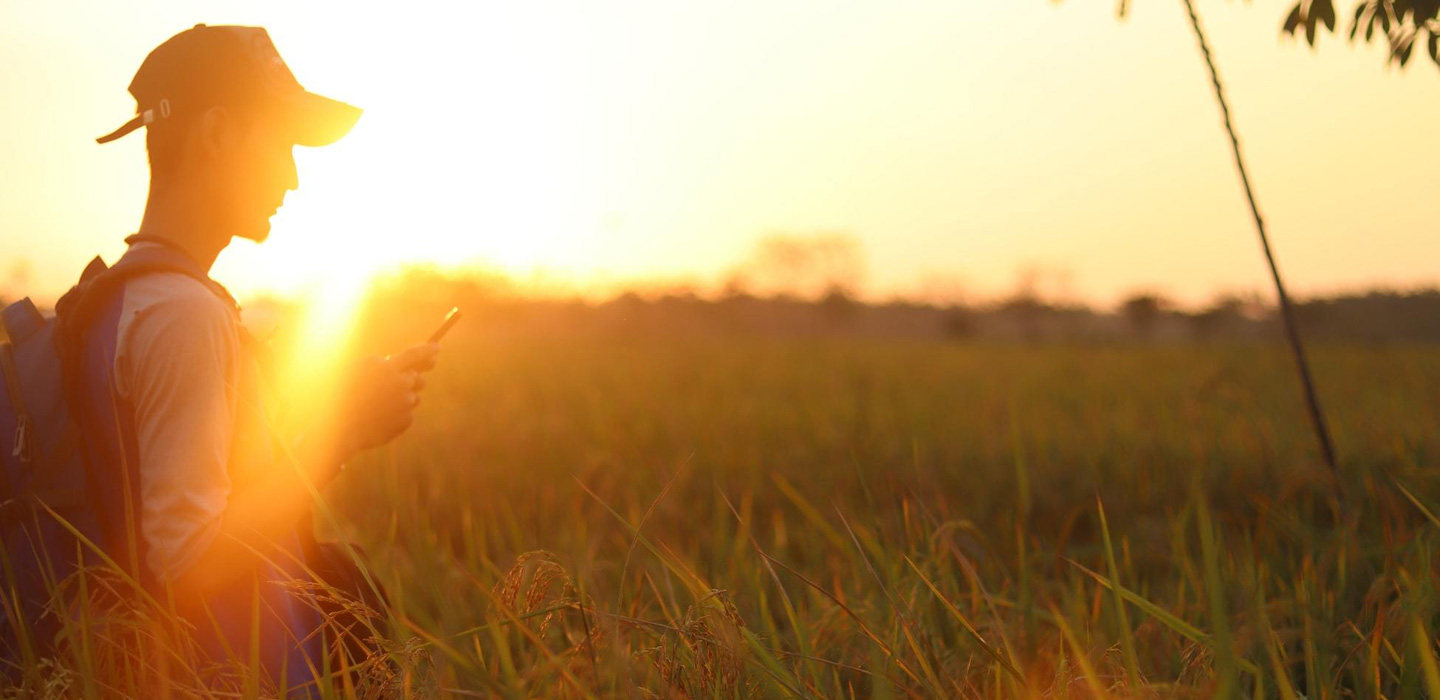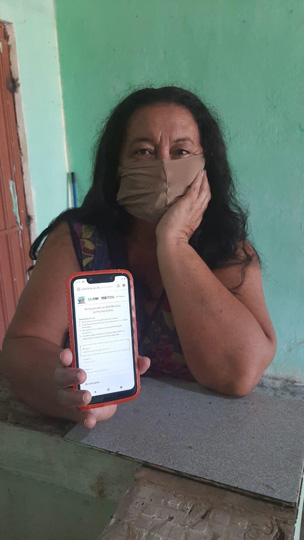Smartphones keep track of IFAD projects’ achievements and challenges in Brazil during COVID-19
IFAD Asset Request Portlet
Asset Publisher
Smartphones keep track of IFAD projects’ achievements and challenges in Brazil during COVID-19
Estimated reading time: 4 minutes
For all the chaos they bring, crises also have a way of giving birth to unexpected opportunities. One way they do this is by urging people to develop new tools to help them resist disaster. Such is the case in north-eastern Brazil, where, despite the country’s struggles with the COVID-19 pandemic, IFAD-funded projects have found new ways to carry on their work.
Starting in late March, for example, project staff began using a remote technical assistance (TA) system to respond to participants’ questions and solve problems.
“Due to the preventive measures, we were not able to go into the communities, so we had to find a way of working with them in these difficult times,” explained Iris Tavares, coordinator for the Paulo Freire project in Ceará. “That’s when we thought of mobile phones, as pretty much all farmers have one or access to one in their family or community.”
Some months later, with the remote TA strategy having proved successful, staff from the Paulo Freire and two other IFAD-funded projects realized that digital communication might have even greater potential than they’d imagined.
They thought it might be an ideal way to check in on participant families and ask how they were coping with the pandemic. They also realized that the current situation presented an opportunity to gather some much-needed data. So, the project staff decided to conduct a survey, with two main goals: one, collecting consistent data on project performance; and two, detecting areas in need of special attention due to the impacts of COVID-19.
“In the day-to-day busy schedule of pre−stay-at-home-orders, this information was much more difficult to collect. Now, we had the time and the means to do it, so we put all hands on deck to seize the opportunity,” said Francisco das Chagas, coordinator of the Viva o Semiárido Project.
Reaching out: An unprecedented effort
During May and June, participants in the Pro-Semiarid project in Bahia, the Viva o Semiárido project in Piauí and the Paulo Freire project in Ceará collectively completed more than 5,000 online questionnaires.
For such a big undertaking, project staff knew they needed to get the word out. They started with a promotional campaign, distributing flyers and circulating voice messages via platforms such as WhatsApp. Some projects even ran announcements on local radio stations.
When the time came to take the survey, the TA teams provided vital support. In the case of Bahia, for example, the Pro-semiarid Project trained 115 young community organizers to coordinate and manage the survey. These organizers regularly support the family farmers’ associations and help manage the project at the local level, so they are very familiar with the communities in which the project operates.
Their role began with sending the project participants a link to the questionnaire. While many were able to record their responses on their own via their smartphones, the organizers remained available for any questions or problems that might arise.
For those who needed assistance, the organizers called the farmers on the phone or even visited them in person, taking all the precautionary measures advised by the World Health Organization.
 |
| A project participant completes the survey on her smartphone. |
For many participants, it was the first survey they’d ever completed. And for nearly all, it was an overwhelmingly positive experience: among all the outreach and support, participants reported feeling reassured that the project was still in touch with them and was concerned about their well-being.
“It was very inspiring to hear how people were really grateful for how the project wanted to know about them in this hard isolation period,” said Angelina Santana, one of the community organizers. “It was also very moving to see families coming together to answer the questionnaire. In some cases, the children were the ones helping their parents get the task done.”
“The questions were focused on our reality and easy to understand,” said Jonaldo, a farmer from the quilombola (Afro-descendant) community of Lagoa Branca, in Bahia. “I thought it was a very good initiative because it makes really clear to us that we have to keep track of everything to know whether we win or we lose.”
Fine-tuning: Survey results bring rapid relief response
According to the survey findings, 90 per cent of participants in Piauí, 88 per cent of those in Ceará, and 54 per cent of those in Bahia have increased their agricultural production thanks to the support of their respective projects. More than 90 per cent of the families across the three projects have adopted new technologies and good practices, such as agroecological approaches (e.g. the use of backyard gardens), water reuse and water-saving irrigation systems, forage management, and the preparation of natural pesticide, biofertilizer and organic manure.
The survey also evaluated some of the effects of the COVID-19 pandemic, finding that it has negatively affected the sales of 77 per cent of participants in Ceará, 68 per cent in Piauí and 54 per cent in Bahia.
These data prompted rapid response measures, such as the activation of state-run programmes for food acquisition and distribution. In Ceará, it also led to the establishment of a family farming online portal that connects sellers and buyers of agricultural products.
“It’s a great tool to strengthen family farming, reduce vulnerability and increase income,” said De Assis Diniz, Ceará’s Secretary of Agrarian Development.
The survey has also generated a great deal of information on the projects’ performance. These data will help project staff fine-tune their interventions and plan the next few years of implementation.
“This work highlights new opportunities and methodologies for monitoring our achievements and challenges. The use of mobile technology made the data collection process very agile and it opens the door for more responsive management of our project,” said Cesart Maynart, coordinator for the Pro-semiarid Project.
More broadly, the setting up of these remote TA services shows that, beyond all the bureaucratic procedures that a large rural development project involves, there is always space for creativity and flexibility when the need to serve neglected communities in a new way becomes imperative.
It has also brought about greater digital inclusion – and it demonstrates that, even in the most remote communities, family farmers are eager to become part of the digital world. And, not least because digital tools open up new opportunities for small-scale farmers to increase their incomes and improve their livelihoods, we’re very glad to welcome them.
Publication date: 30 July 2020